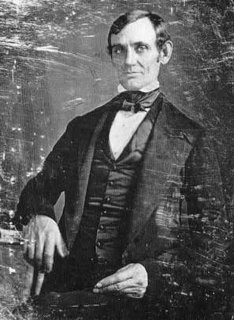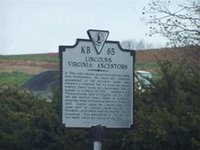
Lincoln was a disappointed heir.
Circumstantially speaking, he was the disappointed heir of a vast fortune (whether he was
emotionally disappointed is another question). Not having the fortune in question did not change who he was – he was from *that* rich Kentucky family and therefore eligible for good marriages – like the one he made with the grand-daughter of the founder of Lexington.
If you didn’t know that, it was because someone intended you not know. It would have confused you, introduced digressions into the Lincoln narrative, and messed up a very fine storyline, “Impoverished, self-made man becomes president.”
We turn off analysis when settling down with a good read. We
know that itinerants do not get to marry into first families; we
know a hewer of wood cannot ordinarily become the richest, most successful trial lawyer in America; but we
accept these possibilities in the course of enjoying a tale. We don’t want motivation or background – that would estrange the hero from the reader.
The great J.G. Randall begins his Lincoln biography with a thumbnail of Lincoln’s father’s situation, something so many others do. Thomas Lincoln is pioneering a farm somewhere. Terribly misleading - something like a manipulation, in fact.

But Randall’s student, David Donald, discloses more family history - history he discounts and his readers ignore. Some of it is in Virginia - we'll pass over that for now - the rest is in Kentucky.
One prelude to the Thomas Lincoln story that is occasionally shared is that the president’s father was saved from Indian mayhem by a shot taken by his brother Mordecai. The president's grandfather Abraham lay slaughtered. Thomas was beside him. Mordecai saved his life. The story was told endlessly in family circles, the president later said.
The missing piece is who Thomas's father was and who Mordecai became.

As Donald points out, the dead Abraham had left no will and Kentucky’s law of primogeniture kicked in. By Donald’s count Mordecai thereby inherited 5,544 acres of prime Kentucky farmland, not exactly a clearing in the wilderness. Oddly, although coming from wealthy Virginia Lincoln stock, Modecai did not adopt that Southern custom of the inheritor adopting his disinherited younger brothers as trustees in the fortune, letting them live on the plantation (manse shown at right), keeping the family together, and paying them stipends.
Instead, he bequeathed to them adventure and to the lazy historians their preferred starting point called "hardship."
Now, you wonder what 5,544 acres represents. At about the same time as Mordecai dispossessed Thomas, “
James Madison received the Montpelier mansion, 100 slaves, and 5,000 acres of land from his father’s estate.”
When his father died, “[Thomas]
Jefferson inherited about 5,000 acres (20 km²) of land and dozens of slaves. He built his home there, which eventually became known as Monticello.”
South Carolina’s leading rice planter stepped into the ranks of the gentry by “1720, [when]
his estate consisted of over 5000 acres and he owned over 100 slaves."
Note the benchmark of 100 slaves (farmhands) being associated with a property of this size. Note that 5,000 acres constitutes an estate.
Lest you think that Kentucky estates of this size were common, note that Thomas Lincoln, years later, ranked as the 15th largest landowner (out of 98) in Hardin County while holding 238 acres. A paternal division of 5,544 acres in three parts would have left each son wealthy (and needing at least 30 farmhands to work their land).
About Thomas Lincoln, his holdings, and his “poverty” - the old yardstick for subsistence farming was “40 acres and a mule.” At 238 acres, Thomas was operating at six times the level of subsistence.
Another yardstick might be the land unit at that time rented out to tenant farmers by the patroons of the Hudson Valley (the Wadsworths, the Delanos) –
it was 100 acres. That 100-acre homestead was intended to support a family and earn enough to pay the annual rent.
I myself live on a former dairy farm of 164 acres. I cannot imagine farming 100 acres with just my family, though a much larger family might manage.
A 238-acre holding, then, was not a subsistence property. Moreover, all told, Thomas held three properties in succession in Kentucky; Donald describes legal challenges directed at each. Presumably, they drove Thomas from holding to holding. The largest such property given in Donald’s
Lincoln is 300 acres.
The Thomas Lincolns moved to Indiana when the president was still a boy to start a fourth farm. You can appreciate that the situation was not poverty, then, but a matter of being land-rich and cash poor with continuous restarting, reclearing, replanting. The president, remembering childhood, referred to a 7-acre field as “the big field,” a fair hint that development of Thomas’s farms only got so far. Interestingly, the pattern repeated itself independent of land claims against him, taking Thomas and kin through a series of Illinois farms.
One wonders if Thomas was selling to achieve small gains in property values (improving, selling, buying, improving), whether he was a farm developer/land speculator rather than a farmer per se. In any case, his son perceived him as poor and struggling, despite the heft in these successive holdings.
While Mordecai - of
those Lincolns - became a celebrated breeder of racehorses, Thomas became the “simple” and “uneducated” brother who failed to ever
establish himself (in the 19th Century vernacular). However, whatever his attainments, Thomas remained a Kentuckian and Mordecai’s younger brother, just as his son Abraham remained
Mordecai’s nephew. Nor was it impossible that Thomas might be remembered in Mordecai's will someday.
Lincoln once made a dark joke about the situation, saying “Uncle Mord had run off with all the talents of the family.” David Donald, apparently a Sunday school dropout, adds, “He had also, in effect, run off with all the money.”
A talent is a unit of currency, of course. More to Lincoln’s point, in the parable of the talents
he- that-hath is given more and from he-that-hath-not is taken away even what little he hath.

Moreover, in the parable, the smallholder is called lazy, wicked or slothful. This lines up with Lincoln’s comments about his father.
So, this is the Lincoln family situation in a nutshell, where we find log cabins on large holdings and the land-rich old man hitting up the future president for a $20 loan late in life.
Donald, who has done much to connect Lincoln with his family draws a curtain across Lincoln’s knowledge of the family’s large Virginia holdings pre-Mordecai. This seems far-fetched to me - Donald's notion stands up only if Abe never asked his father about the move from Virginia and about family life there.
But it doesn’t matter to my point whether he knew about all of his rich forebears. The president knew his uncle Mordecai and he knew that his grandfather died in a melee with the Indians. Given a different outcome to the melee, the president's father could have inherited; or his uncle could have shared; or his grandfather could have survived and divided the property among all three sons; any of these speculations would have been natural. An historical accident produced an unnatural - and unfair - outcome, and this would have crossed the mind of every member of the family.
To those who know Lincoln’s family history, hints of social identiy emerge from the narrative of his life.
* His failure to ever say a good word about his father is a statement in itself. Ignoring his father's deathbed pleas for a visit underlines the point as does the skipping of Thomas' funeral.
* Lincoln's earnings and savings aligned him with that "good steward" of many talents entrusted with much.
* The future president's marriage into the first family of Lexington looks like a return to Lincolnian levels of social status and wealth.
* Lincoln’s law partner Herndon referred to the remarkable ticking of Lincoln’s engine of ambition.
Why, it’s almost as if he had something to prove.
Finally, there is that famous wartime quote: "
I hope to have God on my side, but I must have Kentucky." That is as much a statement of social identity as "
I have not been able to make up my mind to raise my hand against my relatives, my children, my home.”
Now, will our prize-winning authors figure out who Lincoln was before his 200th birthday?












